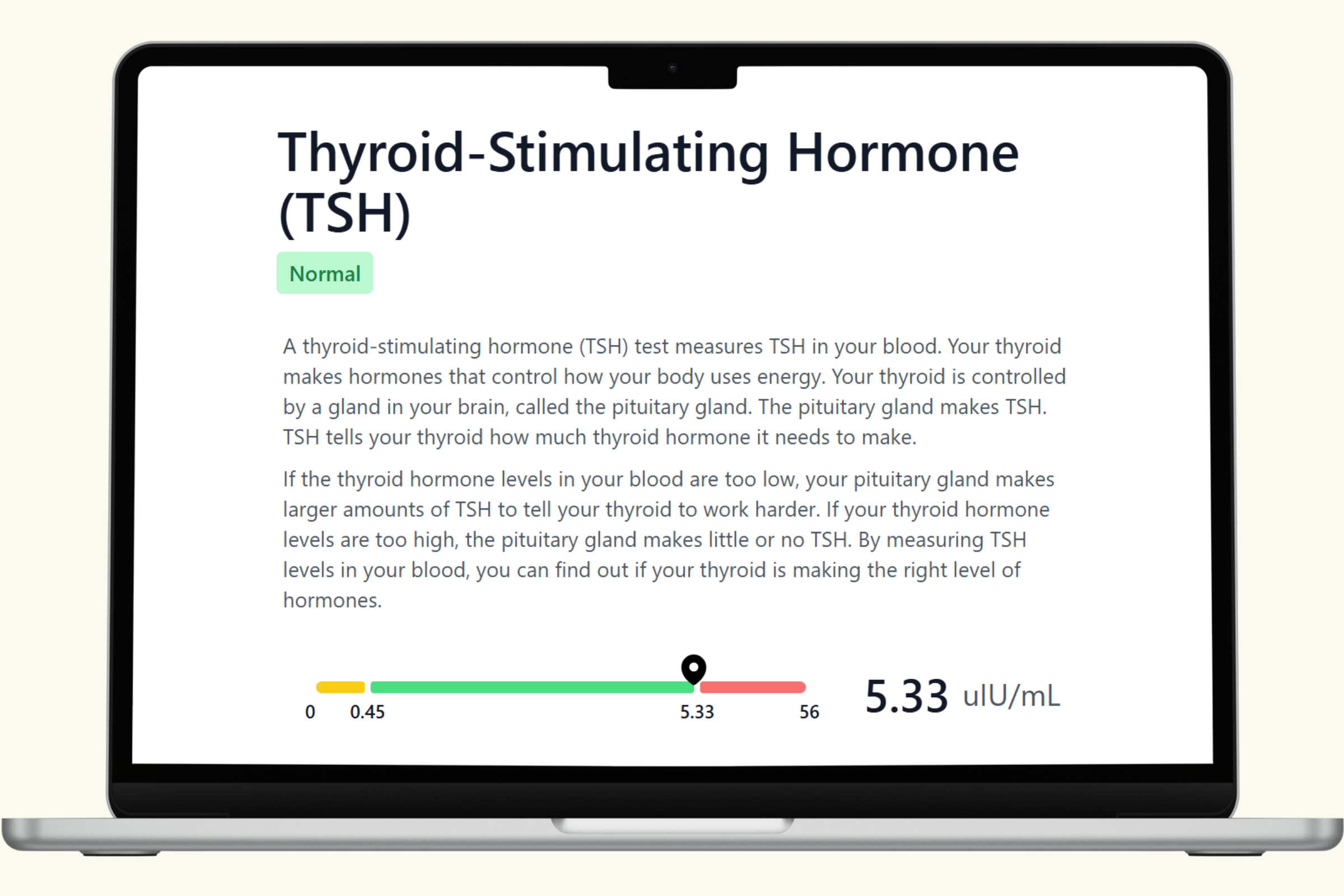Thyroid-Stimulating Hormone (TSH) Blood Test: A Key Marker in Women’s Fertility
The Thyroid-Stimulating Hormone (TSH) Blood Test, included in the PlexusDx Women’s Fertility Blood Test, is one of the most important tools for understanding both thyroid function and reproductive health. TSH is produced by the pituitary gland and plays a central role in regulating thyroid hormones—thyroxine (T4) and triiodothyronine (T3)—which affect metabolism, growth, and energy balance. Because thyroid health is closely linked with ovulation, menstrual regularity, and pregnancy outcomes, monitoring TSH levels is critical for women trying to conceive or experiencing fertility challenges.
Why TSH Matters for Fertility
Thyroid hormones influence almost every cell in the body, but their role in reproduction is especially significant. In women, imbalances in thyroid function can disrupt the delicate hormonal interplay needed for regular cycles, egg quality, implantation, and sustaining a healthy pregnancy. TSH acts as the signal that tells the thyroid gland when to increase or decrease hormone production. If the thyroid is underactive (hypothyroidism), TSH levels rise to stimulate more hormone release. If it is overactive (hyperthyroidism), TSH levels fall as the body tries to reduce thyroid hormone production.
For fertility, the right balance of thyroid hormones is essential. Both too much and too little thyroid activity can interfere with ovulation, luteal phase support, and embryo development. This makes the TSH test a cornerstone in fertility evaluations.
Common Reasons to Test TSH
- Difficulty conceiving – Thyroid imbalances are a common, but often overlooked, cause of infertility.
- Irregular menstrual cycles – Both hypo- and hyperthyroidism can cause cycle disruptions.
- Recurrent miscarriage – Suboptimal thyroid function can increase miscarriage risk.
- Symptoms of thyroid dysfunction – Fatigue, weight changes, mood shifts, hair loss, or cold/heat intolerance.
- Family or personal history of thyroid disease – Women with thyroid conditions or autoimmune disorders like Hashimoto’s or Graves’ disease may be at higher risk of imbalances.
Reference Ranges for TSH
Laboratories may vary slightly in their reference values, but here are the commonly used clinical and functional ranges:
- Standard laboratory reference range: 0.4 – 4.5 mIU/L
- Functional (optimal) range for general health: 1.0 – 2.5 mIU/L
- Recommended range for fertility and pregnancy: Ideally below 2.5 mIU/L (especially in the first trimester)
Levels outside of these ranges may indicate:
- High TSH (>4.5 mIU/L): Suggests hypothyroidism (underactive thyroid)
- Low TSH (<0.4 mIU/L): Suggests hyperthyroidism (overactive thyroid)
- Borderline or subclinical values: May still affect fertility even if not considered “abnormal” by standard labs
How TSH Imbalances Affect Fertility
Even mild thyroid dysfunction can significantly influence reproductive health:
- Hypothyroidism (high TSH, low thyroid hormones): Can lead to anovulation (lack of ovulation), luteal phase defects, low progesterone, and miscarriage risk.
- Hyperthyroidism (low TSH, high thyroid hormones): Can cause irregular or absent periods, decreased egg quality, and complications in early pregnancy.
- Subclinical thyroid dysfunction: Subtle imbalances may not cause obvious symptoms but still interfere with conception and healthy pregnancy outcomes.
TSH and Pregnancy Outcomes
Thyroid health is especially important before and during pregnancy. During early pregnancy, the developing baby relies on the mother’s thyroid hormones for growth and brain development. Imbalances in maternal thyroid function have been linked to:
- Increased risk of miscarriage
- Preterm labor
- Preeclampsia and gestational hypertension
- Developmental delays in the child if untreated
Because of these risks, many fertility specialists recommend keeping TSH levels below 2.5 mIU/L when trying to conceive or in early pregnancy.
Symptoms to Watch For
Many women discover thyroid imbalances during fertility evaluations, but recognizing common symptoms can also be helpful:
- Hypothyroidism symptoms: Fatigue, weight gain, dry skin, constipation, depression, hair thinning, cold intolerance, irregular cycles.
- Hyperthyroidism symptoms: Anxiety, weight loss, palpitations, insomnia, sweating, heat intolerance, frequent bowel movements, irregular or absent cycles.
Specimen Collection with PlexusDx
The TSH Blood Test with PlexusDx uses an at-home dried blood spot collection method with an ADX card. This convenient process allows you to collect a small blood sample from a simple finger prick in the comfort of your home, without needing a clinic visit. Once mailed back to the laboratory, your sample is analyzed with precision, and results are delivered quickly in an easy-to-understand format.
Benefits of Testing TSH Through PlexusDx Women’s Fertility Blood Test
- At-home convenience: Collect your sample anytime, without scheduling a lab appointment.
- Comprehensive fertility panel: TSH is measured alongside other key reproductive hormones for a complete picture of fertility health.
- HSA/FSA eligible: Use pre-tax healthcare dollars to cover the test cost.
- Actionable insights: Results help guide conversations with your healthcare provider about next steps in managing thyroid health and optimizing fertility.
What to Do if Your TSH Is Out of Range
If your results show TSH levels outside of the optimal range, your next step is to discuss them with your healthcare provider. Depending on the direction and degree of imbalance, treatment may include:
- Medication: Levothyroxine for hypothyroidism, antithyroid medications for hyperthyroidism.
- Nutritional support: Adequate intake of iodine, selenium, and iron supports thyroid function.
- Lifestyle changes: Stress reduction, adequate sleep, and balanced nutrition can help stabilize thyroid activity.
- Monitoring: Regular follow-up testing to ensure levels remain in the optimal fertility range.
Conclusion
The Thyroid-Stimulating Hormone (TSH) Blood Test is a vital part of the PlexusDx Women’s Fertility Blood Test. By evaluating how well your thyroid is functioning, this test provides valuable insights into your reproductive health, energy, metabolism, and overall wellness. For women trying to conceive, keeping TSH in the optimal range can make the difference between struggling with fertility challenges and achieving a healthy pregnancy.
With the convenience of at-home collection and clinically reliable results, PlexusDx empowers women to take control of their reproductive journey with the knowledge they need to make informed decisions about their thyroid and fertility health.

Share:
Follicle-Stimulating Hormone (FSH) Blood Test